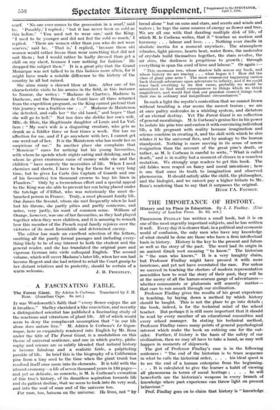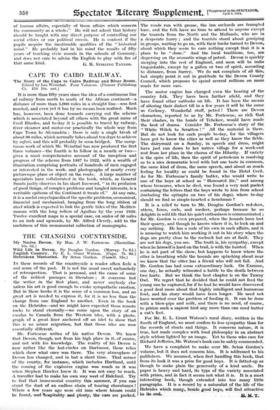THE IMPORTANCE OF HISTORY.
History and its Place in Education. By J. J. Findlay. (Uni- versity of London Press. 3s. 6d. net.) PROFESSOR FINDLAY has written a small book, but it is on one of the most urgently important subjects, and he has written it well. Every day it is clearer that, in a political and economic world of confusion, the only men who have any knowledge of what should be done are those who have a firm intellectual basis in history. History is the key to the present and future as well as the story of the past. The word had its origin in an ancient Greek root meaning " to know." The historian is " the man who knows." It is a very haughty claim, but Professor Findlay might have pressed it with more insistence, and yet not have overstated the case. For unless we succeed in teaching the electors of modern representative assemblies how to read the story of their past, they will be at the mercy of all the harum-scarum gangs of adventurers— whether communists or plutocrats will scarcely matter— that care to rub amuck through our civilization.
Professor Findlay gives the results of his great experience in teaching, by laying down a method by which history should be taught. This is not the place to go into details ; the book, indeed, is for the technical mind of the school teacher. But:perhaps it is still more important that it should be read by every member of an educational committee and every school manager. In stating his technical method, Professor Findlay raises many points of general psychological interest which make the book an enticing one for the out- sider. Further, if history is the basis of the safety of our civilization, then we may all have to take a hand, as may well happen in moments of shipwreck.
The gist of Professor Findlay's case is in the following sentences : " The end of the historian is to trace sequence in what he calls the historical order, . . . his ideal quest is to see the end of a human enterprise from the beginning. . . . It is calculated to give the learner a habit of viewing all phenomena in terms of .som will
al heritage ; . . . he wi henceforth use the historian's weapons in every branch of knowledge where past experience can throw light on present behaviour."
Prof. Findlay goes on to claim that history is " knowledge
of human affairs, especially of those affairs which concern the community as a whole." He will not admit that history should be taught with any direct purpose of controlling our social ethics or our political creeds. He is content if the pupils acquire the inestimable qualities of the " historical mind." He probably had in his mind the results of fifty years of teaching ci vie morals in the schools of Germany, and does not care to advise the English to play with fire of



























































 Previous page
Previous page